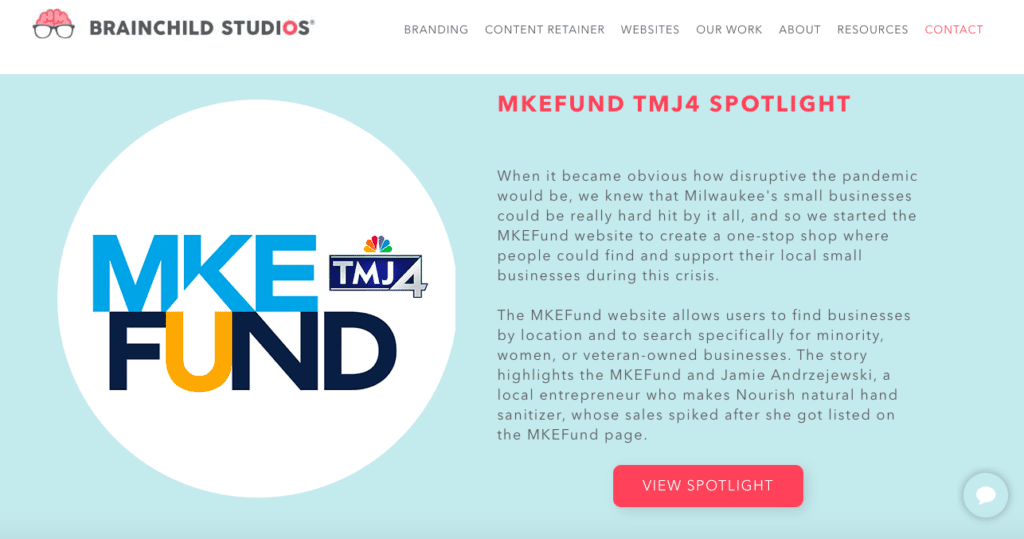
A media kit is like a resume and cover letter for your business, all wrapped up in one PDF or digital portfolio. It highlights who you are, what you do, and what your next steps are. The difference lies in what you use it for: media kits are valuable resources you can keep on hand for when you need to provide pertinent information about your business to media representatives, potential collaborators, or even new clients. While the final look is up to you—and there’s a lot of flexibility with how you “decorate” your media kit—the key components are the same. And when you include these seven features, you’re well on your way to making a big impression in your industry.
Tell Your Story
Let’s clear something up real quick. Some people use the terms “press kit” and “media kit” interchangeably, and others consider them completely different assets. For our purposes, a press kit is an asset you hand off to your media contacts when they’re writing an article about your company. On the other hand, a media kit can serve this purpose too, but can also be a resource for anybody you want to share your story with—collaborators, industry experts, prospective clients, and more. It’s a way to summarize all the pertinent information about your company in a well-designed package. So, let’s talk about what you need to include in your package.
Somewhere on your media kit, you need to tell your story. Make sure every word you include in those few paragraphs makes an impact. If you don’t have a lot of experience with storytelling, here are a few questions to get the juices flowing:
- How do you contribute to the evolution of your industry?
- What are your values, vision, and mission?
- How would your audience describe what you do?
- What sets you apart from other companies with a similar business model?
- How do you change peoples’ lives?
- What have you learned as your business has grown?
- If you could only tell somebody one thing about what you do, what would it be?
Do you see a theme with all of these questions? We’re getting to the root of what you do and who you are, beyond the “We’re company A, and we sell product Y” information that somebody can easily find through a Google search. You can also expand upon your business story to include key players from your leadership team. Especially if you opt for a digital portfolio, you can include an entire section with leadership bios and headshots. You can jazz it up even more by including quotes or Q&As from your key players, though these are the icing on the cake. From company background to key players, the way you lay out your story should take into consideration your branding.
Infuse It With Your Branding

When you build your media kit, it’s essential to include your branding. And if you’re building your media kit using a template from a graphics-savvy company like Adobe or Canva, you can customize using image files of your logo and your key players, and even the hexadecimal codes for your brand colors. Besides the graphical elements of your brand, include your brand voice and tone. If you haven’t defined how you talk to your audience, it’s vital you do before you create your media kit.
Your brand voice is who is speaking when they write on behalf of your brand. Think a trusted expert, a knowledgeable friend, your cool aunt who’s seen the world. Tone is how you speak to your audience. Ponder how you want to be received by your audience. We can describe tone using adjectives like friendly, upbeat, honest, sassy, formal, confident, or relatable. Your word choice can emulate these descriptors.
As you’re putting your media kit together, always ask, does this reflect who we are? It’s a good idea to do a gut check with anything you put out into the world.
Press… Meet the Press
When constructing your media kit, link any recent press releases. Why? Recent press releases, or news articles, for that matter, show there’s an ongoing public interest in your company. These media assets provide a lot of context to media people and show that your company gets attention and will be more likely to increase their page views than an unknown company staying out of the public eye. You can add oomph to your digital backlog of press releases by including any data if you have access. We’re talking clicks, likes, views, shares, etc. Including data about your press releases and news articles is not mandatory, but if you’re going to include any “proof” of your success, lean hard into industry awards and accolades.
Include Your Juicy Data, Especially Awards

Social media influencers often include their social media stats in their media kits. We’re talking about followers, page views, and demographic data. For a company or brand, you can include relevant data for what you do. Start by including awards or accolades you’ve won in your industry. You can also include data like page views for your company’s blog, social media engagement, or growth statistics such as how many members you’ve added to your team over the years. Whichever data you decide to include, highlight it using your brand guidelines and make it pop visually. We’re talking numbers, diagrams, and graphs.
A media kit should not be a text wall and will incorporate high-quality images and graphics to make it both scannable and appealing to look at.
Share Your Impact With Case Studies
When crafting your media kit, include links to case studies. Case studies are opportunities to dig deep into one of the chapters of your company’s story. It’s a detailed rundown of something your company did, from problem identification to solution development to tracking results. Including case studies is literal proof of your company’s impact on your industry, and vital information to provide the press as they wrap their head around your role in your community and how they might speak to your impact. If you have an annual report, you can include that too, but prioritize case studies; they’re gold.
Include Logos, B-roll, and Company-Approved Images
If you opt for a digital media kit, you can include a lot more assets available at the click of the link you provide interested parties. In this digital space, you can include downloadable logo files and high-res images, including leadership headshots, to speed up the process and make everybody’s life easier. Don’t forget to include B-roll footage that fits your brand identity for any video productions your company may be part of. When you make these assets available to, in most relevant cases, the press, there’s less back and forth.
Fully-built out media kit – emailing back and forth = more time for you
Don’t Forget Your Contact Info
Sometimes the most obvious things are the most easily forgotten. Allow us to put our Captain Obvious hat on for a minute. Don’t. Forget. Your. Contact. Info. Quick pop quiz: which team member’s contact info is the most important to include in your media kit. Yep, your publicist is right. Your PR person is going to be able to communicate most effectively with any external contacts, and their contact info should be front and center.
And while you’re slotting in your company email address, street address, and phone number, add links to your social media accounts as well. Social media is here to stay, and it’s another avenue to build brand awareness, start conversations, sell products, and increase traffic to your website. Make sure you include your social links everywhere you can—media kit included.
Successful Media Kits Fit Your Business Goals
While we consider these seven elements to be must-haves for any media kit, you’ll need to trust yourself when it comes to putting the finishing touches on yours. Perhaps you want to include previous press coverage or case studies. It’s not unheard of to have FAQs as part of a media kit. We trust you’ll use your discretion to best suit your business goals, and remember, you can always edit digital media. Now, it’s time to spread your wings and fly free into the world of media relations.
And if you need an extra boost of confidence or want to talk about the nitty-gritty of media kits, get in touch. We’re here to talk shop!
The post 7 Can’t-Miss Features to Include in Your Media Kit appeared first on Brainchild Studios®.

